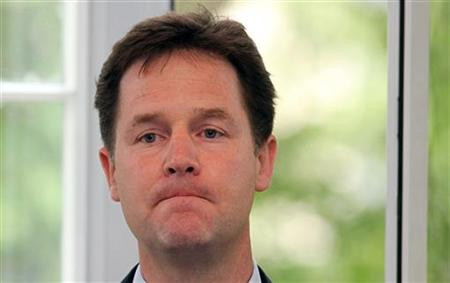Liberal Democrat Conference 2011: Why the Liberal Democrats Must Leave the Coalition Today

The Liberal Democrats 2011 conference has started with an explosive speech by party President Tim Farron, claiming that the party should look to step away from the coalition before the next election. That is not far enough. The Liberal Democrats must go one step further and leave the coalition immediately in a bid to restore its battered reputation.
In what was a speech clearly designed to put pressure on Nick Clegg as well as rally party delegates who are disillusioned with how the first year in government has gone. Delegates are keen to put pressure on Deputy Prime Minster Nick Clegg due to the feeling that Liberal Democrats are being ignored and even walked over in major government issues with many delegates sighting the tuition fee rises and health care reforms as examples of this.
"The Coalition may be a good natured marriage but it is only temporary," he said. "I don't want to upset you and it's not going to happen for three or four years but I'm afraid divorce is inevitable," he added.
In a sustained attack on the Conservative party, Mr Farron lambasted David Cameron's party by claiming that it was the Liberal Democrats were the party keeping the Tories from enacting 'repugnant' tax cuts on the rich.
"Liberal Democrat ministers are the guarantors of fairness in a government that would be an absolute nightmare without them," he said.
Lib Dems also "stood up against reactionary Tory drivel after the riots," he said, and accused Conservatives of neglecting their own voters and being "rarely seen anywhere near their constituency".
It has been a quiet period for the coalition but Mr Farron's speech will no doubt open old wounds, especially when it comes to both the tuition fee rises and health care reform. Added to this, Mr Farron has ranked the pressure on Mr Cameron and Mr Clegg by raising the issue of nuclear power, a direct challenge to his party leader.
Clearly delegates have seen the Liberal Democrats time in government as something of a step back and feel the party needs to distance itself from the Tory name. However, the feeling within the party is that is not possible due to the fear the party has over the economic troubles across the world. It was the economic crisis that forced Nick Clegg's hand in joining with the Tories and it is the economic troubles that are keeping them there.
The coalition's economic austerity strategy has few public Lib Dem critics, even as growth falters, inflation rises and unemployment surges reports the Telegraph. What is clear is that the Lib Dems are a frightened party and leaving the country to the hands of the Conservatives during the economic crisis is not an option for many within the party but at some stage the Liberal Democrats need to have a debate over this issue.
The contention within the party now is what is the national interest? Can the Liberal Democrats afford to continue in their coalition with the Conservative party? The lines are clearly blurred, but what is clear is that the Liberal Democrats image has been tarnished because of their affiliation with Mr Cameron's party. The Conservative's told the country in May 2010 they would introduce deep cuts, and they have; voters knew what they were getting.
With the Liberal Democrats voters believed they were getting a party that stood up for students and people on low incomes. Does their record in government show this? Sadly, it is difficult to see Lib Dem minsters' role in cabinet anymore.
Leaving the coalition now is the only option if the party wants to be electable in the next general election. However, changes in the structure of the party need to take place. The party needs to re-group, unite under a new leader and look to restore the public's confidence in them. If they stay in the coalition until the next general election they risk being wiped off of the political landscape and the work that the party has done over the 50 years will be thrown down the drain.
© Copyright IBTimes 2025. All rights reserved.





















